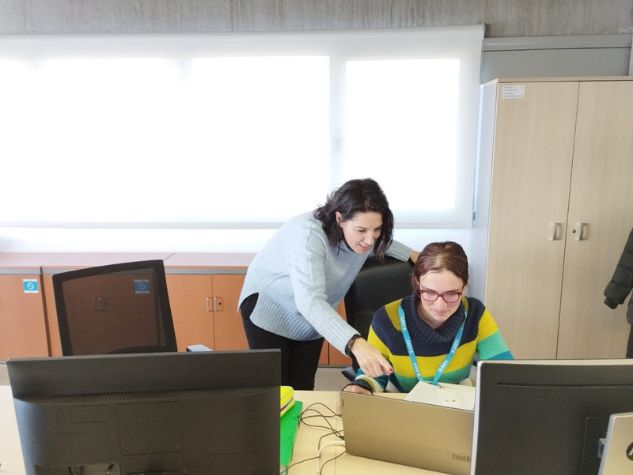Adolescence: That Pivotal Moment
When children reach adolescence, whether they have Down syndrome or not, they sometimes think their parents have become very annoying. Here are some tips for those parents who no longer know how to talk to their teenagers.
- Clear and Sufficient Explanations
One of the biggest frustrations for parents is not knowing if their children have understood what has been explained to them. This uncertainty can lead parents to repeat the same explanation over and over again, hoping to ensure that the message has been understood. However, unnecessary repetition can be counterproductive, as it can make teenagers feel patronized and frustrated.
It is important to trust in teenagers’ ability to understand. If the teenager has comprehended and listened to the message, there is no need to repeat it. This not only shows confidence in their ability but also gives them the opportunity to handle the information by themselves.
On the other hand, if the teenager has difficulty understanding, it is essential for parents to be patient and willing to explain things more slowly and clearly. In such cases, using concrete examples and breaking down the information into smaller steps can be helpful. Additionally, parents can ask open-ended questions to check understanding and allow the teenager to express any doubts or confusion they may have.
- Accept That Children Grow Up
Adolescence is a transitional period where children begin to develop their own identity and seek independence. Many parents struggle to accept that their children are growing up and continue trying to control them in the same way they did when they were younger. This can lead to a dynamic where parents constantly repeat what they believe their children should do, without recognizing the achievements and knowledge they have already acquired.
It is essential for parents to recognize and respect their children’s growth and maturity. This means giving them space to make their own decisions and make mistakes, which is a natural part of the learning process. Instead of focusing on what hasn’t been done, parents should focus on their children’s accomplishments and progress. This positive attitude not only improves the parent-child relationship but also fosters the teenager’s self-esteem and independence.
Additionally, parents should be willing to listen and give advice only when asked. As teenagers grow, they need to learn to make decisions for themselves. Parents should have patience and give them time to seek advice when they need it. This trust in their abilities will help them develop greater confidence and responsibility.
- Avoid Overloading with Too Much Information
It’s common for parents to want to share all the information possible with their children to ensure they are well-prepared for life. However, giving too much information at once can be overwhelming for teenagers. When parents try to explain many things at once, they do not give their children time to think and process the information at their own pace, which can lead to information overload and stress.
It is important for parents to learn to communicate information clearly and concisely and to allow their children to process it at their own pace. Instead of flooding teenagers with too many details, parents should prioritize the most important information and present it in an organized manner. It is also helpful to give them time to reflect and ask questions. This not only helps teenagers better understand the information but also teaches them important processing and information management skills.
- Foster Autonomy and Independence
Teenagers are at a stage where they seek to establish their own identity and autonomy. It is crucial for parents to support this process and allow their children to make decisions and take on responsibilities. This does not mean that parents should withdraw completely, but they should find a balance between providing support and allowing independence.
One way to foster autonomy is to involve teenagers in decision-making that affects their daily lives. This can include decisions about their education and extracurricular activities, as well as responsibilities at home. By giving them the opportunity to participate in decision-making, parents show that they trust their abilities and judgment.
It is also important for parents to respect their children’s decisions, even if they do not always agree with them. This not only strengthens the teenager’s confidence but also teaches them to take responsibility for their actions and decisions. In situations where the teenager makes mistakes, parents should offer support and guidance, rather than criticism, to help them learn and grow from their experiences.
- Create an Open Communication Environment
Open and honest communication is fundamental for a healthy parent-child relationship. Teenagers need to know that they can talk to their parents about anything, without fear of being judged or punished. To foster this communication, parents must be accessible and willing to listen without interrupting or prejudging.
It is helpful to establish regular times to talk and catch up. This can be during dinner, at the end of the day, or any time that works for the family. During these conversations, parents should show genuine interest in their children’s lives, ask open-ended questions, and listen actively. It is also important to validate their feelings and experiences, which helps them feel understood and supported.
Additionally, parents should be willing to share their own experiences and feelings. This not only models open and honest communication but also shows teenagers that their parents are human and have gone through similar experiences. This empathy and understanding can strengthen the relationship and help teenagers feel more connected and supported.
- Manage Stress and Pressure
Adolescence can be a stressful stage for both children and parents. Teenagers face a variety of pressures, from academic to social, and it is important for parents to be aware of these challenges and offer support. Parents should avoid adding unnecessary pressure and instead provide an environment that promotes well-being and resilience.
One way to manage stress is to help teenagers develop time management skills and problem-solving strategies. This can include planning tasks, setting realistic goals, and practicing relaxation techniques. Parents can also teach their children the importance of balancing work and leisure time, ensuring they have time for recreational and social activities they enjoy.
Furthermore, it is crucial for parents to model healthy stress management. Teenagers learn by observing their parents, so it is important for parents to manage their own stress in a healthy way and show how to face challenges constructively.
Adolescence is a crucial stage in children’s development, and parents play a fundamental role in this process. By adopting a comprehensive and respectful approach, parents can support their children on their path to independence and maturity. This involves providing clear and sufficient explanations, accepting that children are growing up, avoiding information overload, fostering autonomy, creating an open communication environment, and managing stress effectively.
By following these tips, parents can help their teenage children navigate this stage with confidence and success, building a strong and supportive relationship that will benefit both in the years to come.


















